
Top 5 Advantages and Disadvantages of Entrepreneurship You Should Know
Oct 08, 2025 3 Min Read 3159 Views
(Last Updated)
Are you confused about whether entrepreneurship is right for you? Not sure of the advantages and disadvantages of entrepreneurship? We got you covered!
In this blog, we will look into an entrepreneur’s responsibilities and the top 5 advantages and disadvantages of entrepreneurship. Understanding both the advantages and disadvantages of entrepreneurship can help you decide if entrepreneurship is the right path for you. Let’s get started!
Table of contents
- What is Entrepreneurship?
- Who is an Entrepreneur?
- Advantages and Disadvantages of Entrepreneurship
- Advantages of Entrepreneurship
- Disadvantages of Entrepreneurship
- Getting Started with HCL Guvi
- Conclusion
- FAQs
- Q1. Who can become an entrepreneur?
- Q2. What are the key qualities of a successful entrepreneur?
- Q3. How do entrepreneurs make money?
- Q4. What is the biggest challenge in entrepreneurship?
What is Entrepreneurship?
Entrepreneurship is the process of creating and running a new business to make a profit. It involves the entire process of identifying a business opportunity, taking financial risks, organizing resources, and building it together to create and grow the business. It includes innovation, risk-taking, resource management, leadership, and value creation.
Who is an Entrepreneur?
An entrepreneur is a person who identifies a business opportunity, creates and grows the business by taking a huge financial risk in the hope of making a profit. The responsibilities of an entrepreneur include:
- They are responsible for creating a business plan that outlines the vision, goals, and financial strategy.
- They raise capital funding from investors, banks, or from personal savings.
- They design and refine the product based on the market needs.
- They recruit the right people and create a productive work environment.
- They promote the business and drive revenue through different marketing tragedies.
- In the early-stage startup, they manage the budgets, accounting to ensure profitability.
- They build strong relationships with customers, partners, and stakeholders.
Advantages and Disadvantages of Entrepreneurship
In this section, we will cover the advantages and disadvantages of entrepreneurship.
Advantages of Entrepreneurship
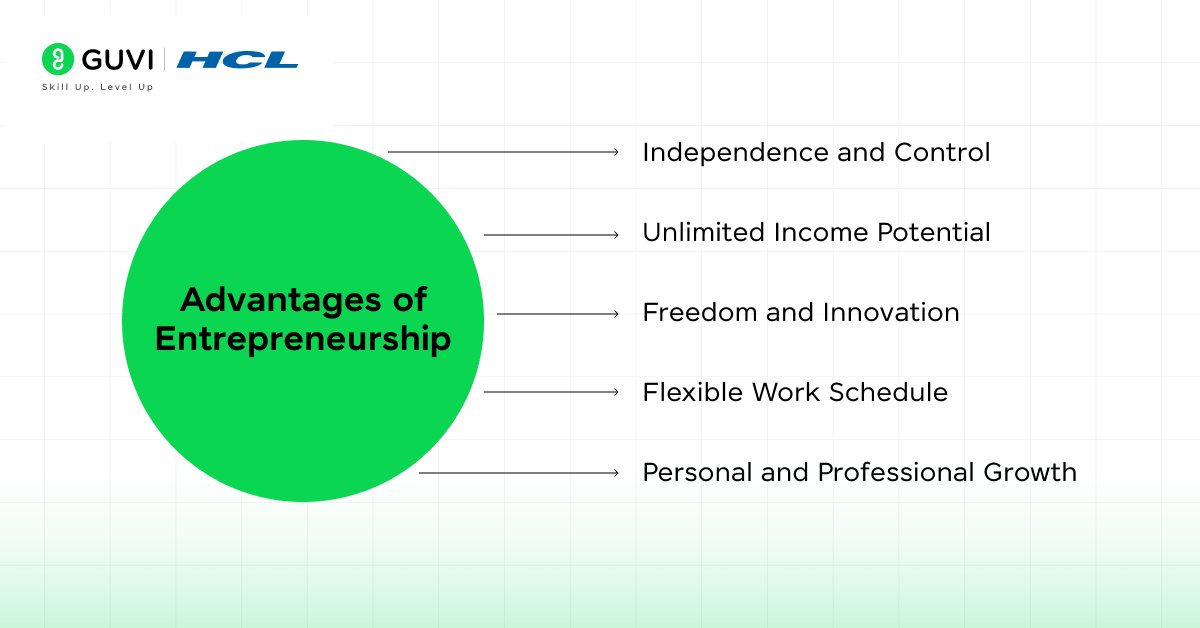
Entrepreneurship offers several advantages that attract people to start their businesses. It allows individuals to take control of their careers and potentially earn more money than a regular job. Let’s look into the top 5 advantages of entrepreneurship.
1. Independence and Control
- One of the biggest advantages of entrepreneurship is the independence it provides. Entrepreneurs can make their own decisions in their business, and there is no need to follow a boss’s orders.
- For example, if you open a bakery, you can choose what to sell, how to price the items, and when to open or close the shop.
- This level of control is very satisfying for people who like to be in charge of their work.
2. Unlimited Income Potential
- Unlike a regular job that provides a fixed salary, entrepreneurship offers the chance to earn as much as the business can grow.
- If the business has great growth and does well, there is no limit to how much you can make as an entrepreneur.
- For example, you start an online clothing store, which begins with a few sales but could grow to earn thousands or even millions if the business becomes successful and popular.
Find out: Entrepreneurship Projects: Ideas, Types, and Getting Started
3. Freedom and Innovation
- Entrepreneurs have the freedom to create their innovations and experiment with new ideas to build creative solutions to problems. Their creativity and innovation are not limited by company rules or traditions.
- For example, if you love eco-friendly products, you might invent something new, such as a new type of reusable bag, and sell it online.
- This type of freedom to innovate will lead you to exciting opportunities and success.
4. Flexible Work Schedule
- Entrepreneurs are not bound to working 8 hours a day (9 to 5). They have the freedom to set their work schedules.
- This is helpful for people who want to balance work with family and personal commitments.
- For example, if you are a freelancer, you can choose to work either during the day or at night, depending on your lifestyle.
5. Personal and Professional Growth
- Building a business helps people learn many new skills, from managing finances to marketing.
- This will help in building both personal and professional growth.
- For example, you start a small cafe and learn how to handle staff, suppliers, and customers, which helps you grow as a person and a business owner.
Discover: Mastering the Fundamentals of Entrepreneurship
Disadvantages of Entrepreneurship
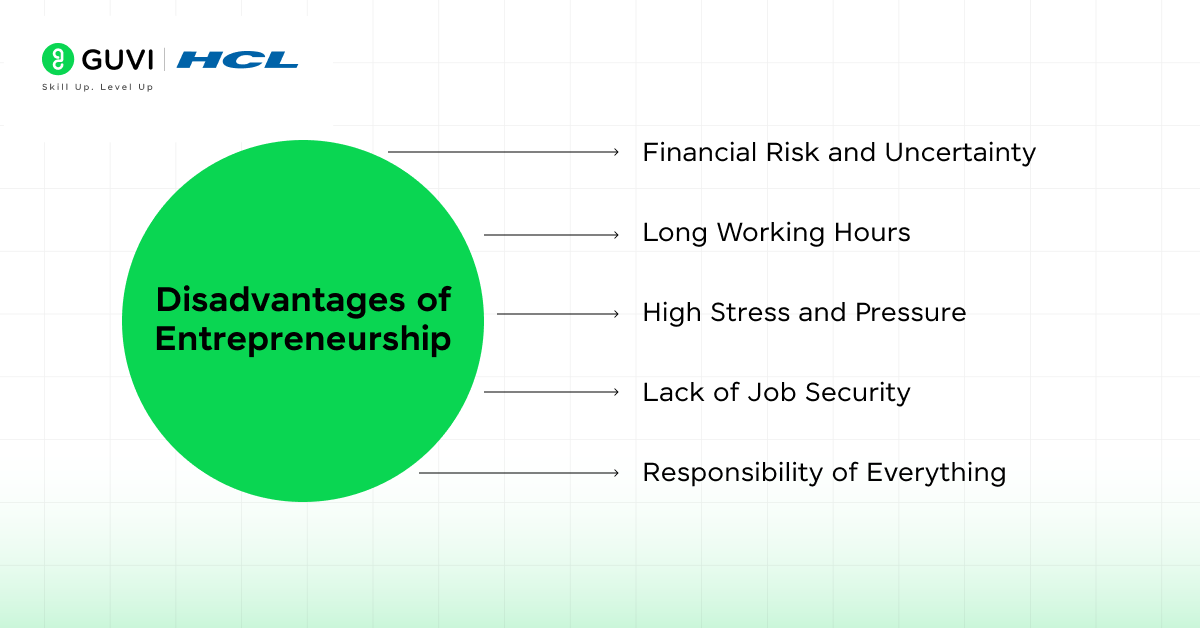
Entrepreneurship also has several disadvantages that stop people from starting a business. While being your boss can be exciting, it also comes with many challenges and risks. Let’s look into the top 5 disadvantages of entrepreneurship.
1. Financial Risk and Uncertainty
- Starting your own business requires a lot of money upfront, and there is no guarantee of success. Entrepreneurs invest their savings and can still face losses.
- For example, you open a small restaurant that may not get enough customers in the first few months and might struggle to pay rent or chefs.
- These financial uncertainties can be very stressful for you.
2. Long Working Hours
- Entrepreneurs usually work longer hours than regular employees.
- They take up various roles themselves, such as marketer, developer, and manager, that may need to work late nights, weekends, and even holidays.
- For instance, let’s consider you own a flower shop, you might wake up early to buy fresh flowers and stay late arranging orders, leaving little time for rest.
3. High Stress and Pressure
- As an entrepreneur, running a business can be stressful because you are responsible for making all the major decisions.
- You have to deal with customer complaints, financial issues, and competitors.
- For example, if sales drop in your business, you might feel a lot of pressure to fix the problem quickly, which can affect your mental health.
4. Lack of Job Security
- Unlike regular nine-to-five jobs with fixed salaries and benefits, entrepreneurship offers no guaranteed income.
- If the business fails, the entrepreneur may be left with no earnings at all.
- For example, if you start a business using a mobile app, it might not earn anything for months if users don’t download the app or pay for the app.
5. Responsibility of Everything
- Entrepreneurs are responsible for everything that happens in their business, from planning to marketing and handling customers.
- This can be overwhelming, especially when it comes to a solo business.
- For instance, if you are running a home-based baking business, you must bake, pack, market, deliver, and manage orders all on your own, which can be exhausting and stressful.
Find out: What is the Scope of Entrepreneurship in 2025?
Getting Started with HCL Guvi
If you are interested in starting your journey as an entrepreneur, consider enrolling in HCL Guvi’s Entrepreneurship course. It provides a detailed roadmap towards your entrepreneurship journey under 7 hours. By taking this course, you can launch your own business within a few months.
Conclusion
Entrepreneurship can be a rewarding path filled with independence, innovation, and personal growth. However, it also involves financial risks, long hours, and high levels of responsibility. If you are prepared to face uncertainty and handle pressure, the rewards can be great. By understanding the advantages and disadvantages of entrepreneurship, you can make informed decisions and increase your chances of building a successful business.
FAQs
Q1. Who can become an entrepreneur?
Anyone with a business idea, passion, and willingness to take risks and learn can become an entrepreneur regardless of age, background, or education.
Q2. What are the key qualities of a successful entrepreneur?
Key qualities include creativity, resilience, leadership, risk tolerance, adaptability, and strong problem-solving skills.
Q3. How do entrepreneurs make money?
Entrepreneurs earn money by selling products or services that solve problems or meet needs in the market, generating revenue and profit over time.
Q4. What is the biggest challenge in entrepreneurship?
The biggest challenge is managing risk and uncertainty especially in funding, competition, and building a customer base.
























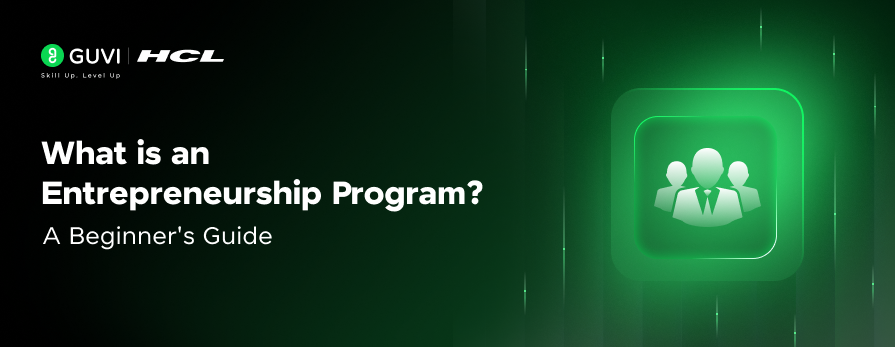

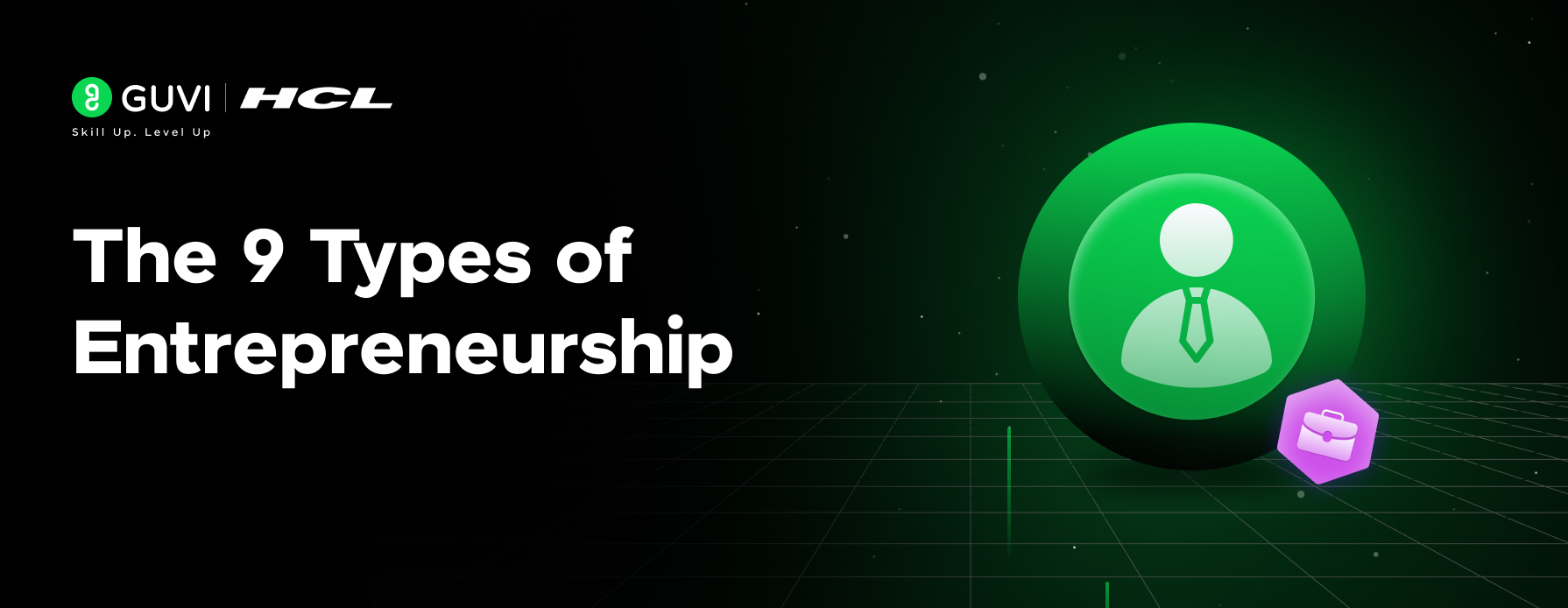


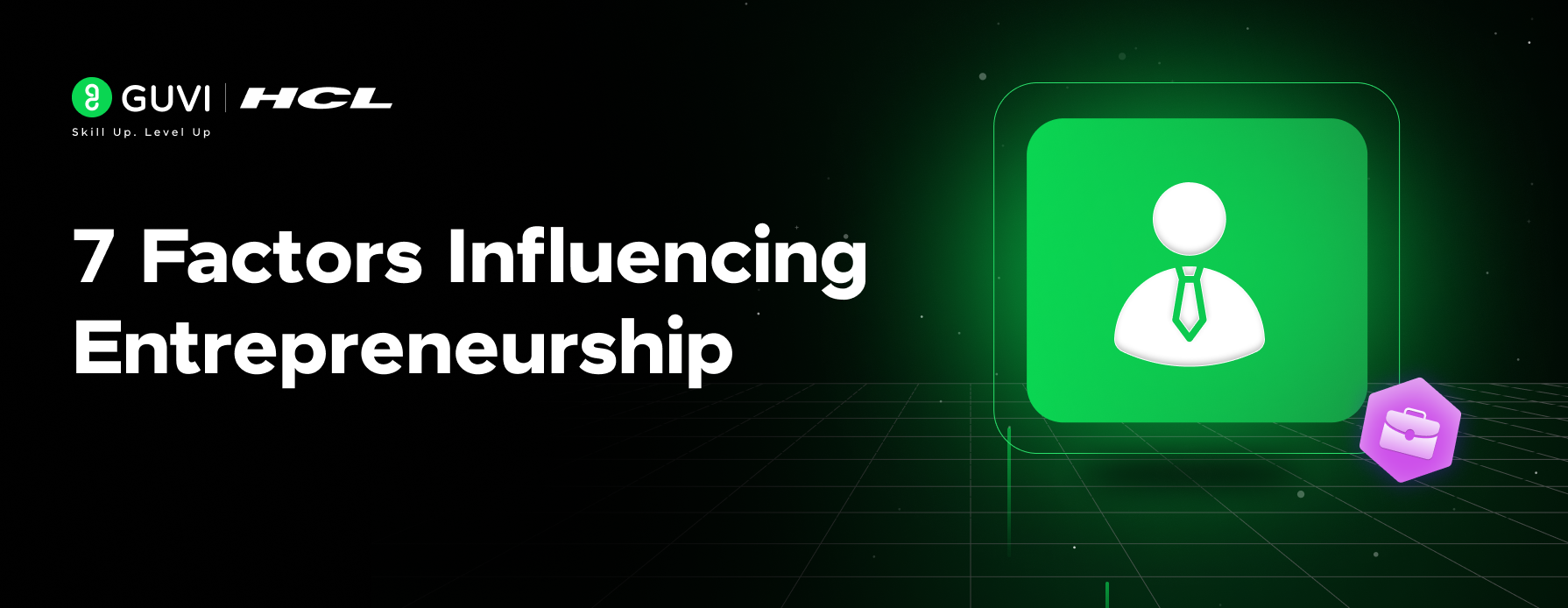
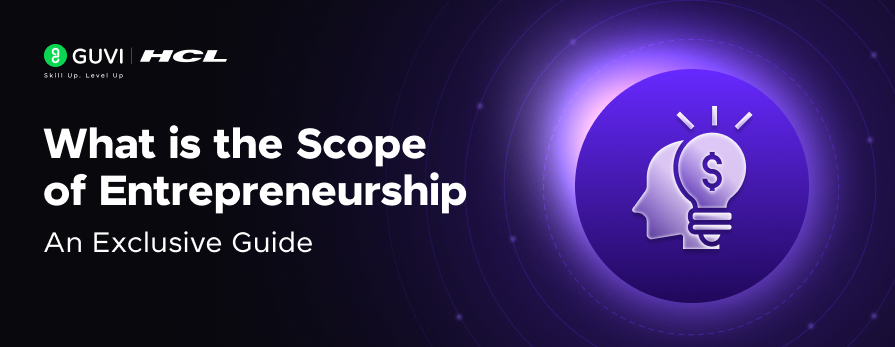





Did you enjoy this article?